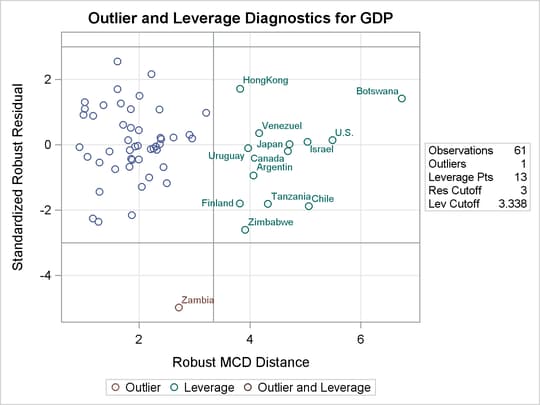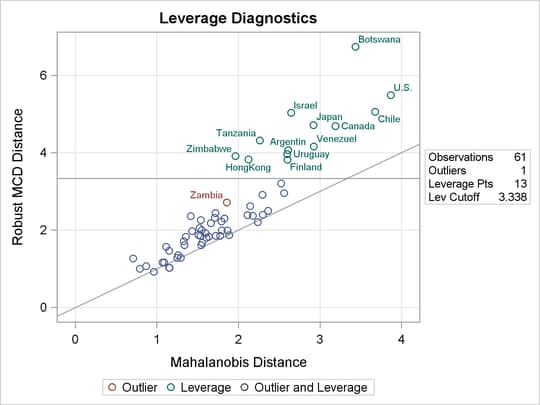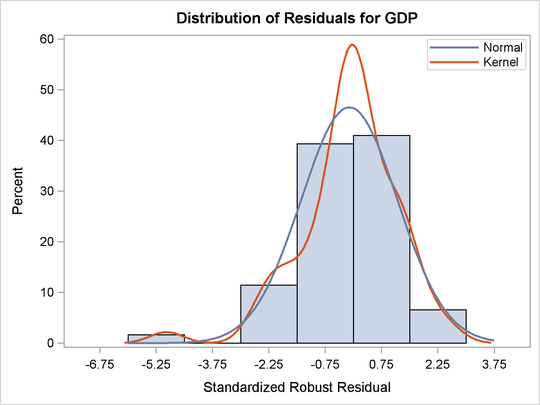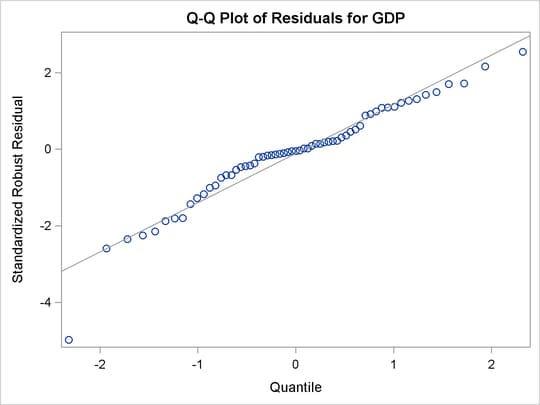The ROBUSTREG Procedure
Robust regression and outlier detection techniques have considerable applications to econometrics. This example, from Zaman, Rousseeuw, and Orhan (2001), shows how these techniques substantially improve the ordinary least squares (OLS) results for the growth study of De Long and Summers.
De Long and Summers (1991) studied the national growth of 61 countries from 1960 to 1985 by applying OLS to the following data set:
data growth; input country $ GDP LFG EQP NEQ GAP @@; datalines; Argentin 0.0089 0.0118 0.0214 0.2286 0.6079 Austria 0.0332 0.0014 0.0991 0.1349 0.5809 Belgium 0.0256 0.0061 0.0684 0.1653 0.4109 Bolivia 0.0124 0.0209 0.0167 0.1133 0.8634 Botswana 0.0676 0.0239 0.1310 0.1490 0.9474 ... more lines ... Venezuel 0.0120 0.0378 0.0340 0.0760 0.4974 Zambia -0.0110 0.0275 0.0702 0.2012 0.8695 Zimbabwe 0.0110 0.0309 0.0843 0.1257 0.8875 ;
The regression equation that they used is
where the response variable is the growth in gross domestic product per worker (GDP) and the regressors are labor force growth (LFG), relative GDP gap (GAP), equipment investment (EQP), and nonequipment investment (NEQ).
The following statements invoke the REG procedure (see Chapter 85: The REG Procedure) for the OLS analysis:
proc reg data=growth; model GDP = LFG GAP EQP NEQ; run;
The OLS analysis that is shown in Output 86.3.1 indicates that GAP and EQP have a significant influence on GDP at the 5% level.
Output 86.3.1: OLS Estimates
| Parameter Estimates | |||||
|---|---|---|---|---|---|
| Variable | DF | Parameter Estimate |
Standard Error |
t Value | Pr > |t| |
| Intercept | 1 | -0.01430 | 0.01028 | -1.39 | 0.1697 |
| LFG | 1 | -0.02981 | 0.19838 | -0.15 | 0.8811 |
| GAP | 1 | 0.02026 | 0.00917 | 2.21 | 0.0313 |
| EQP | 1 | 0.26538 | 0.06529 | 4.06 | 0.0002 |
| NEQ | 1 | 0.06236 | 0.03482 | 1.79 | 0.0787 |
The following statements invoke the ROBUSTREG procedure and use the default M estimation:
ods graphics on; proc robustreg data=growth plots=all; model GDP = LFG GAP EQP NEQ / diagnostics leverage; id country; run; ods graphics off;
Output 86.3.2 displays model information and summary statistics for variables in the model.
Output 86.3.3 displays the M estimates. Besides GAP and EQP, the robust analysis also indicates that NEQ is significant. This new finding is explained by Output 86.3.4, which shows that Zambia, the 60th country in the data, is an outlier. Output 86.3.4 also identifies leverage points that are based on the robust MCD distances; however, there are no serious high-leverage points in this data set.
Output 86.3.3: M Estimates
| Parameter Estimates | |||||||
|---|---|---|---|---|---|---|---|
| Parameter | DF | Estimate | Standard Error |
95% Confidence Limits | Chi-Square | Pr > ChiSq | |
| Intercept | 1 | -0.0247 | 0.0097 | -0.0437 | -0.0058 | 6.53 | 0.0106 |
| LFG | 1 | 0.1040 | 0.1867 | -0.2619 | 0.4699 | 0.31 | 0.5775 |
| GAP | 1 | 0.0250 | 0.0086 | 0.0080 | 0.0419 | 8.36 | 0.0038 |
| EQP | 1 | 0.2968 | 0.0614 | 0.1764 | 0.4172 | 23.33 | <.0001 |
| NEQ | 1 | 0.0885 | 0.0328 | 0.0242 | 0.1527 | 7.29 | 0.0069 |
| Scale | 1 | 0.0099 | |||||
Output 86.3.4: Diagnostics
| Diagnostics | ||||||
|---|---|---|---|---|---|---|
| Obs | country | Mahalanobis Distance | Robust MCD Distance | Leverage | Standardized Robust Residual |
Outlier |
| 1 | Argentin | 2.6083 | 4.0639 | * | -0.9424 | |
| 5 | Botswana | 3.4351 | 6.7391 | * | 1.4200 | |
| 8 | Canada | 3.1876 | 4.6843 | * | -0.1972 | |
| 9 | Chile | 3.6752 | 5.0599 | * | -1.8784 | |
| 17 | Finland | 2.6024 | 3.8186 | * | -1.7971 | |
| 23 | HongKong | 2.1225 | 3.8238 | * | 1.7161 | |
| 27 | Israel | 2.6461 | 5.0336 | * | 0.0909 | |
| 31 | Japan | 2.9179 | 4.7140 | * | 0.0216 | |
| 53 | Tanzania | 2.2600 | 4.3193 | * | -1.8082 | |
| 57 | U.S. | 3.8701 | 5.4874 | * | 0.1448 | |
| 58 | Uruguay | 2.5953 | 3.9671 | * | -0.0978 | |
| 59 | Venezuel | 2.9239 | 4.1663 | * | 0.3573 | |
| 60 | Zambia | 1.8562 | 2.7135 | -4.9798 | * | |
| 61 | Zimbabwe | 1.9634 | 3.9128 | * | -2.5959 | |
Output 86.3.5 displays robust versions of goodness-of-fit statistics for the model.
The PLOTS=ALL option generates four diagnostic plots. Output 86.3.6 and Output 86.3.7 are for outlier and leverage-point diagnostics. Output 86.3.8 and Output 86.3.9 are a histogram and a Q-Q plot, respectively, of the standardized robust residuals.
The following statements invoke the ROBUSTREG procedure and use LTS estimation, which was used by Zaman, Rousseeuw, and Orhan (2001). The results are consistent with those of M estimation.
proc robustreg method=lts(h=33) fwls data=growth seed=100; model GDP = LFG GAP EQP NEQ / diagnostics leverage; id country; run;
Output 86.3.10 displays the LTS estimates and the LTS R square.
Output 86.3.11 displays outlier and leverage-point diagnostics that are based on the LTS estimates and the robust MCD distances.
Output 86.3.11: Diagnostics
| Diagnostics | ||||||
|---|---|---|---|---|---|---|
| Obs | country | Mahalanobis Distance | Robust MCD Distance | Leverage | Standardized Robust Residual |
Outlier |
| 1 | Argentin | 2.6083 | 4.0639 | * | -1.0715 | |
| 5 | Botswana | 3.4351 | 6.7391 | * | 1.6574 | |
| 8 | Canada | 3.1876 | 4.6843 | * | -0.2324 | |
| 9 | Chile | 3.6752 | 5.0599 | * | -2.0896 | |
| 17 | Finland | 2.6024 | 3.8186 | * | -1.6367 | |
| 23 | HongKong | 2.1225 | 3.8238 | * | 1.7570 | |
| 27 | Israel | 2.6461 | 5.0336 | * | 0.2334 | |
| 31 | Japan | 2.9179 | 4.7140 | * | 0.0971 | |
| 53 | Tanzania | 2.2600 | 4.3193 | * | -1.2978 | |
| 57 | U.S. | 3.8701 | 5.4874 | * | 0.0605 | |
| 58 | Uruguay | 2.5953 | 3.9671 | * | -0.0857 | |
| 59 | Venezuel | 2.9239 | 4.1663 | * | 0.4113 | |
| 60 | Zambia | 1.8562 | 2.7135 | -4.4984 | * | |
| 61 | Zimbabwe | 1.9634 | 3.9128 | * | -2.1201 | |
Output 86.3.12 displays the final weighted least squares estimates, which are identical to those that are reported in Zaman, Rousseeuw, and Orhan (2001).
Output 86.3.12: Final Weighted LS Estimates
| Parameter Estimates for Final Weighted Least Squares Fit | |||||||
|---|---|---|---|---|---|---|---|
| Parameter | DF | Estimate | Standard Error |
95% Confidence Limits | Chi-Square | Pr > ChiSq | |
| Intercept | 1 | -0.0222 | 0.0093 | -0.0405 | -0.0039 | 5.65 | 0.0175 |
| LFG | 1 | 0.0446 | 0.1771 | -0.3026 | 0.3917 | 0.06 | 0.8013 |
| GAP | 1 | 0.0245 | 0.0082 | 0.0084 | 0.0406 | 8.89 | 0.0029 |
| EQP | 1 | 0.2824 | 0.0581 | 0.1685 | 0.3964 | 23.60 | <.0001 |
| NEQ | 1 | 0.0849 | 0.0314 | 0.0233 | 0.1465 | 7.30 | 0.0069 |
| Scale | 0 | 0.0116 | |||||




